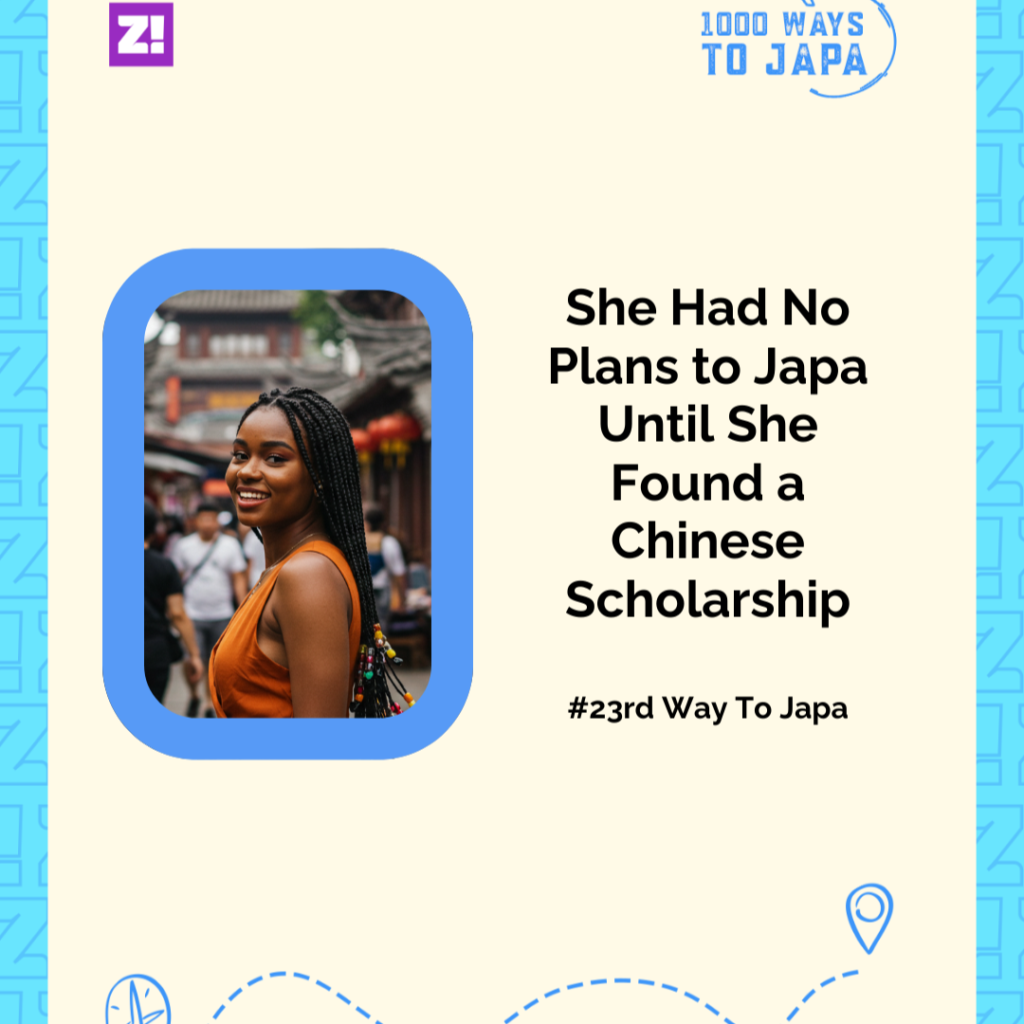Someone you know has left or is planning to leave. 1,000 Ways To Japa will speak to real people and explore the infinite number of reasons and paths they use to get to Japa
Muna (26) knew her life was going to change the moment she secured a full scholarship to study in China. In this edition of 1,000 Ways to Japa, she shares how she got the scholarship and why China is the perfect japa destination for Nigerians.

Where do you live, and when did you move from Nigeria?
I live in Chengdu, China, a city in the Sichuan province, and I’ve been here since 2019. I came to China to further my education and have been here ever since.
Why did you choose China?
This is one of the most common questions people ask me, and I know it’s because most Nigerians prefer to move to the UK, US, Canada, or Europe. For me, it all started with learning the Chinese language. Initially, I was just learning it because it was an available option, but then I discovered that I could work as a translator and earn good money. That realization motivated me to take it more seriously. Eventually, I learned about a scholarship opportunity, applied, and got in. That’s how I ended up in China.
What scholarship is that?
I came to China through the Confucius Institute Scholarship. There are Confucius Institutes in different parts of Nigeria, one in Lagos and another at Nnamdi Azikiwe University, where I studied. The process was quite straightforward. First, I enrolled in a Confucius Institute because you need to learn the Chinese language to qualify for this particular scholarship. After that, I worked on reaching a high proficiency level because a higher proficiency level increases, your chances of securing the scholarship ( I studied up to level six). Finally, I took the scholarship exam, passed it, and applied through the Confucius Institute.
Are there other Chinese scholarships Nigerians can apply for?
Yes. The Confucius Institute Scholarship is just one of many options. There are scholarships like the Chinese Government Scholarship, the Presidential Scholarship, the One Belt, One Road Scholarship, and university-specific scholarships. These scholarships come with a monthly stipend as well. Most Nigerians don’t realize they have these options and focus only on Western countries, but China offers great opportunities, too. Another perk that comes with China is that it is easier to move to another country after studying here for a while.
Can anyone apply for a Chinese scholarship?
Not all scholarships require Chinese proficiency. The Confucius Institute Scholarship does, but others accept applicants with just English proficiency. It depends on the specific scholarship and university.
What do you do now?
The japa trend in Nigeria inspired me to start a business teaching people the Chinese language and culture while guiding them through the scholarship application process. If you’re interested in studying in China, my startup provides step-by-step guidance on applying and securing funding.
What advice do you have for Nigerians who want to study in China?
If you’re considering applying, my top recommendation is to learn Chinese if possible. It’s not compulsory for all scholarships, but it increases your chances and gives you more options. Also, apply early because applications usually open in October and close between March and May, depending on the scholarship and university. If securing a scholarship seems too stressful, consider self-sponsorship. You’re likely to afford it because studying in China is much more affordable than in the UK or the US.
How much does it cost to study in China?
The cost can be specific to each university and course. Tuition fees for a bachelor’s degree generally cost between 8,000 to 17,000 RMB per year, while a master’s degree can cost anywhere between 10,000 and 55,000 RMB per year. At the current exchange rate (about 1 RMB = 200 Naira), this means a bachelor’s degree could cost between ₦2M and ₦3.4M per year, while a master’s degree could range from ₦2M to ₦11M per year, depending on the course and university.
What are some of the benefits of studying in China?
One of the main benefits of studying in China is the exposure to different cultures. You meet people from various backgrounds and get to learn a new language. Many students arrive with no knowledge of Chinese, but after spending a few years there, they end up becoming fluent in the language.
Studying in China also allows you to move to another country if you decide not to stay long-term. Additionally, if you’re interested in business, China offers opportunities to start your own, even as a student. Many people don’t know that international students can own a registered business in China.
Another major thing is that students are now allowed to work part-time, unlike before when they were completely restricted. The current limit is 20 hours per week.
How did your family and friends react when you decided to move to China?
It was actually my dad who suggested I study Chinese. At the time, I was preparing for JAMB. One day, my dad noticed that the university I was attending had a Chinese language department, and he encouraged me to check it out. We went together and got some information, and that’s how I decided to give it a shot.
When I finally got the scholarship, my family was excited. I didn’t tell many people about my plans. I wanted to be sure I had the scholarship first before saying anything.
Did you share the news when you got the scholarship?
Not really. When the scholarship confirmation came in July, I had less than a month before leaving, so I didn’t have time to tell too many people.
What were your first thoughts when you arrived in China?
I tried not to have any specific expectations, but I knew that my life would improve. Still, the change made me anxious because I usually don’t handle change well. Leaving my family behind to go to a completely new place was overwhelming. I didn’t know if there would be other Nigerians at my university since my friends and I had been placed in different schools. I didn’t even know if there were Nigerians in the city, so I had no idea what to expect in terms of community.
Before arriving, a few Chinese colleagues had told me that the city’s weather was moderate, but being Nigerian, even their “not too cold” was still freezing for me.
Getting used to the food and adjusting to the culture took time. It was a long process, but eventually, I settled in.
What were your biggest culture shocks?
There were many, but the few that really stood out to me included constant stares and people taking photos of you without your knowledge. The differences in the education system also stood out to me. Back home, 70% is considered an ‘A’ in some schools, but in China, 70-79% is a ‘C’. I thought I was doing amazing until I realized how different the grading system was. It definitely made me sit up and rethink how I approached my studies. Another culture shock was how easy things are in China compared to Nigeria. Things just work differently here. It’s smoother and more organized.
Also, the way people use their phones took some getting used to. It’s normal to see someone walking down the street, glued to their phone, and bump into you without apologizing because they don’t think it’s a big deal. Even after five years, I’m still shocked by it.
What’s your favourite thing about living in China?
My favourite thing about living in China is how easy life is here. Honestly, life is easy. If you miss a bus, another one will come in just five minutes. If you miss the train, another one shows up in two or three minutes, sometimes even within a minute. And then there’s online shopping— you can order anything, and it’ll be delivered right to your door, no matter where you are. If I don’t want to leave my house for a week, I could just stay in, and everything will be delivered straight to me. It’s convenient.
Compared to my friends in the US, who are always talking about running after buses or working in the snow, it’s a completely different experience here.
How happy would you say you are in China, on a scale of 1 to 10?
Well, it’s been a journey, so I’d say my happiness has changed over time. When I first came in 2019, it was okay, but I was struggling with the food and the weather. I’d probably rate it a five back then because adjusting was tough. From 2020 to 2022, things were really hard, especially with COVID. The lockdown was mentally challenging for me. My school did its best to take care of us, but it was still lonely. But from 2023 onwards, things started to get better. I graduated in 2023, and that period was a real struggle. At one point, I even planned to leave China after graduation. But I’ve outgrown that phase. I’m happier now, so my happiness level is seven.
Want to to share your japa story? Please reach out to me here.




